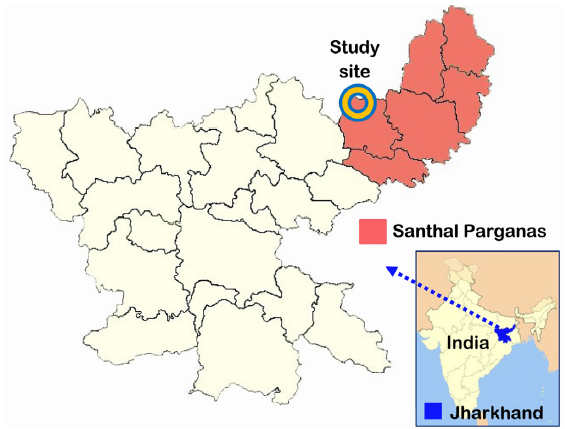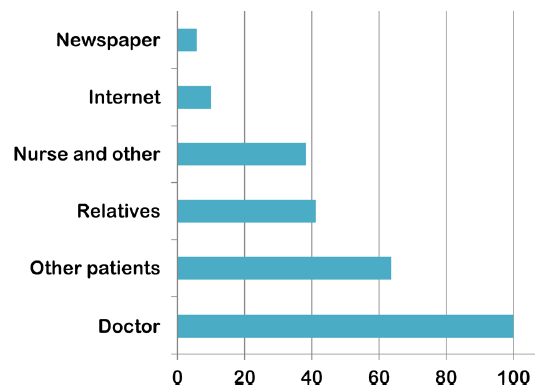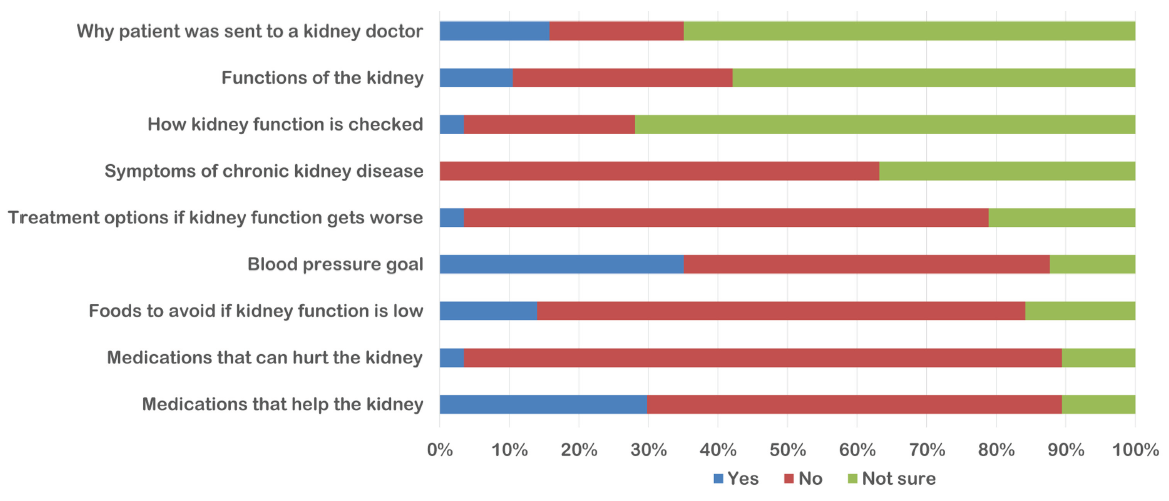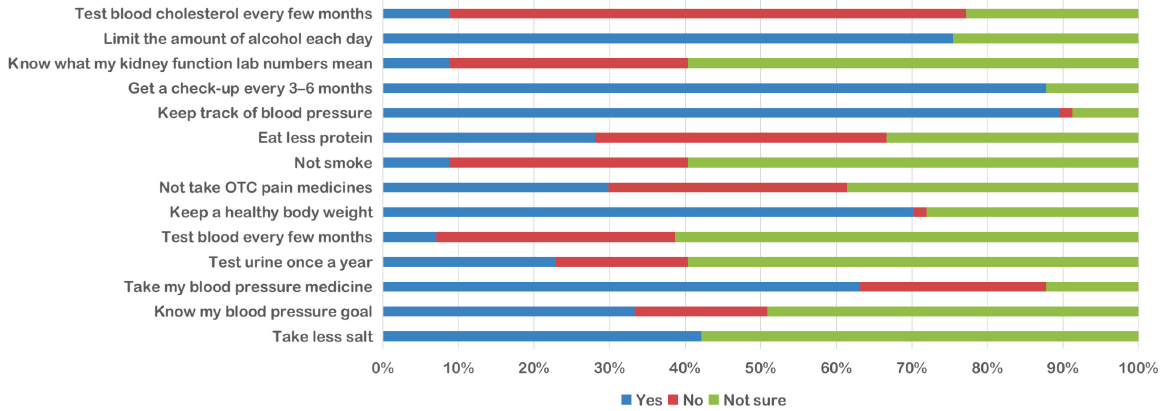Translate this page into:
Assessment of Patient Awareness Regarding Chronic Kidney Disease Management in Santhal Parganas
Corresponding author: Himel Mondal, Department of Physiology, All India Institute of Medical Sciences (AIIMS), Deoghar, Jharkhand, India. E-mail: himelmkcg@gmail.com
-
Received: ,
Accepted: ,
How to cite this article: Juhi A, Sahoo M, Gupta AK, Pinjar MJ, Dhanvijay A, Kumari A, et al. Assessment of Patient Awareness Regarding Chronic Kidney Disease Management in Santhal Parganas. Indian J Nephrol. 2025;35:77-81. doi: 10.25259/IJN_14_2024
Abstract
Background:
Chronic kidney disease (CKD) is a global health challenge, and effective self-management is crucial for optimal outcomes. Assessing the prevailing knowledge about CKD in patients can help strategies information education communication program to better manage the disease. This study evaluated the current knowledge of self-management of CKD among patients suffering from CKD in Santhal Parganas of Jharkhand state in India.
Materials and Methods:
This cross-sectional survey was conducted in a tertiary care teaching hospital situated in Deoghar, Jharkhand, India from June to December 2023. Patients suffering from CKD were enrolled for this study from the Outpatient Department. The Chronic Kidney Disease Self-Management Knowledge Tool (CKD-SMKT) was used to measure patients’ knowledge through face-to-face interviews conducted by a trained local surveyor.
Results:
A total of 228 patients with a mean age of 52.63±10.65 years (men 136 [59.65%], women 92 [40.35%]) participated in the survey. All the patients (100%) gained knowledge about CKD from doctors, followed by other patients (63.6%) and relatives (41.23%). On average, 53.61% did not have proper knowledge about overall kidney disease. Correct knowledge about maintaining kidney health was among 38.1% of patients with 36.59% unsure about their knowledge and 25.31% declaring their lack of knowledge.
Conclusion:
A low level of knowledge about kidney health was found among the patients suffering from CKD in Santhal Parganas, a region with a tribal population with a low literacy rate. The identified knowledge gap emphasizes the need for a tailored educational program for CKD patients by doctors and patients relative.
Keywords
Chronic kidney disease
Literacy
Self-management
Renal insufficiency
Tribal population
Introduction
Chronic kidney disease (CKD) is a global health concern with increasing prevalence in India.1 As a progressive condition, CKD poses substantial challenges for patients, healthcare providers, and healthcare systems. Effective management of CKD necessitates not only medical interventions but also informed and empowered patients who actively participate in their care.2 Knowledgeable patients are better equipped to make informed decisions about lifestyle modifications, adhere to prescribed medications, and engage in preventive measures. Effective self-management can contribute significantly to the control of key risk factors, such as hypertension and diabetes, which are common underlying causes of CKD.3 Schrauben et al. reported that a lower level of perceived knowledge about kidney disease may indicate lower self-care.4 Therefore, assessing and enhancing patients’ knowledge about self-management of CKD is an integral component of a holistic approach to CKD care.
A study conducted in New Delhi, India found that patients suffering from diabetes mellitus have a poor level of knowledge of CKD.5 Furthermore, a study conducted in a rural area of Maharashtra, India reported that caretakers of CKD patients have poor knowledge and attitude but good practices toward CKD.6 Hence, both patients and their caretakers have a poor level of knowledge. In addition to these findings, Jafar et al. reported that the primary obstacles at the patient level in India for CKD management revolved around insufficient understanding and awareness of CKD.7 Hence, for overall improvement of self-management, a higher level of knowledge should be acquired. Tribal populations or individuals with low literacy often face unique challenges in the management of CKD due to a combination of socioeconomic, cultural, and educational factors.8 In addition, cultural practices and beliefs may influence health-seeking behavior and adherence to medical recommendations. Low literacy levels can contribute to a lack of understanding about the importance of lifestyle modifications, medication adherence, and regular follow-ups, essential elements in CKD management. Furthermore, language barriers and a lack of health literacy materials tailored to specific cultural contexts can exacerbate these challenges.9
The Santhal Parganas, in the district of Deoghar, Jharkhand is a region with a tribal population that has a unique challenge for language, culture, and accessibility of healthcare facilities with unique healthcare dynamics.10 There are a fair number of patients visiting the tertiary care center for their healthcare needs. However, due to the long distance of the hospital from their villages, many of the patients may not visit the center regularly. Hence, self-management becomes an integral part of their disease management.
With this background, we aimed to identify the level of knowledge of self-management of CKD among the patients suffering from CKD and attending the hospital for their treatment. The findings of this study hold the potential to inform healthcare stakeholders about strategies and foster a proactive approach to future patient education initiatives for CKD patients for the overall well-being of the community and to reduce the burden of CKD on the healthcare system.
Materials and Methods
This was a cross-sectional study to assess the knowledge of patients aged 18 years and above attending the All India Institute of Medical Sciences (AIIMS), Deoghar, from June 2023 to December 2023. The study focused on patients visiting the Medicine Outpatient Department (OPD) during the specified period. The study site in map is shown in Figure 1.

- Study site in Santhal parganas in the state of Jharkhand in India.
Data collection instrument
The Chronic Kidney Disease Self-Management Knowledge Tool (CKD-SMKT) was utilized as the primary instrument to evaluate the knowledge of patients regarding the self-management of CKD. The CKD-SMKT is a validated questionnaire specifically designed to assess patients’ understanding of various aspects of CKD management, including risk factors, lifestyle modifications, medication adherence, and preventive measures.11 We obtained permission from the developer of the questionnaire before starting the study.
Sampling
Convenience sampling was employed to select participants for this study. Patients aged 18 years and above attending AIIMS Deoghar during the study period and visiting the Medicine OPD for their treatment, buying medicines, or accompanying other patients were invited to participate. The diagnosis of CKD and categorization in stages were confirmed by their last glomerular filtration rate available in their patient history booklet. With 6969097 population, 99% confidence interval, and 10% error, the minimum sample size was 167. However, we aimed to include more patients than the minimum sample size.
Data collection procedure
A trained local surveyor with expertise in the subject matter conducted face-to-face interviews with the participants and filled out the form. The surveyor followed the CKD-SMKT questionnaire to assess patients’ knowledge levels. The interviews were conducted in a private and comfortable setting to ensure the confidentiality of responses and to encourage open communication. A same-sex attendant was present in the survey room to make the patients comfortable.
Ethical considerations
The Institutional Review Board of AIIMS Deoghar approved this study with number 2022-60-EMP-02, dated 30-01-2023. Written informed consent was obtained from all participants before their inclusion in the study, and they were assured of the confidentiality and anonymity of their responses. The patients were above 18 years of age, which makes them eligible for providing their consent. When the patient could not sign, a left thumb impression was obtained after the surveyor explained the informed consent to the patient. A witness who is not related to the research but accompanying the patient or other patients was also present during the process and signed the paper or provided a thumb impression.
Data analysis
Quantitative data obtained through the CKD-SMKT were analyzed using appropriate statistical methods. Descriptive statistics are used to compute and summarize participant characteristics and knowledge levels.
Results
A total of 228 patients with a mean age of 52.63±10.65 years (men 136 [59.65%], women 92 [40.35%]) participated in the survey. The demographics of the research participants are presented in Table 1. The majority of the participants (33.33%) were deprived of education. Among the participants, 38.6% were unemployed followed by 24.56 self-employed. About half of the patients (49.12%) had stage III CKD followed by stage IV (38.6%).
| Variable | Category | Number | Percentage |
|---|---|---|---|
| Sex | Male | 136 | 59.65 |
| Female | 92 | 40.35 | |
| Marital status | Married | 223 | 97.81 |
| Unmarried | 5 | 2.19 | |
| Residence | Rural | 197 | 86.4 |
| Urban | 31 | 13.6 | |
| Ethnicity | Tribal | 184 | 80.7 |
| Nontribal | 44 | 19.3 | |
| Education | Deprived | 76 | 33.33 |
| <10 standard | 52 | 22.81 | |
| 10–12 standard | 32 | 14.04 | |
| >12 standard | 68 | 29.82 | |
| Occupation | Self-employed | 56 | 24.56 |
| Agriculture | 32 | 14.04 | |
| Homemaker | 40 | 17.54 | |
| Retired | 12 | 5.26 | |
| Unemployed | 88 | 38.6 | |
| CKD stage | I | 0 | 0 |
| II | 0 | 0 | |
| III | 112 | 49.12 | |
| IV | 88 | 38.6 | |
| V | 28 | 12.28 | |
| CKD patient | In family | 6 | 2.63 |
| In relatives | 14 | 6.14 | |
| In neighborhood | 22 | 9.65 |
CKD: chronic kidney disease.
All the patients gained knowledge about self-management of their disease from doctors. The next source of information is other patients suffering from the same disease, followed by relatives of the patients. The source of information is shown in Figure 2.

- Source of information about self-management of chronic kidney diseases.
On average, 53.61% did not know about overall kidney disease, 33.58% of patients were confused about the accuracy of their knowledge, and only 12.87% perceived proper knowledge. The individual item-wise score is shown in Figure 3.

- Overall knowledge about chronic kidney disease.
Knowledge about maintaining kidney health in CKD is shown in Figure 4. On average, 38.1% knew how to take care of their kidney health, 36.59% were unsure about their knowledge, and 25.31% declared their lack of knowledge.

- Knowledge about maintaining kidney health in chronic kidney disease. OTC: Over the counter.
Discussion
Exploring CKD knowledge in low-literacy areas such as Santhal Parganas in Deoghar, Jharkhand was of paramount importance due to the intricate relationship between health literacy and effective disease management. Low-literacy regions often face heightened challenges in accessing and comprehending healthcare information, leading to delayed diagnosis and suboptimal management of chronic conditions like CKD. In this study, we found that the majority of the respondents are education-deprived and unemployed. The concentration of individuals with limited education and unemployment highlights potential barriers to health literacy, which can potentially hinder the comprehension of CKD management strategies and adherence to medical recommendations.12,13 In addition, the distribution of CKD stages, with a substantial proportion in stages III and IV, emphasizes the urgency of tailored interventions to address disease progression. Hence, a holistic management approach that considers the socioeconomic context focusing on educational and employment interventions alongside medical strategies to optimize CKD care is needed in this population.
The distribution of sources of knowledge on CKD, with predominant reliance on doctors followed by input from other patients, relatives, and healthcare professionals, divulges the multifaceted nature of information dissemination within the studied population. A strong reliance on healthcare professionals, particularly doctors and nurses, emphasizes the pivotal role of the medical community in educating and guiding patients.14 In addition, the influence of peer learning from other patients and support from relatives signifies the importance of a collective, community-based approach to CKD awareness. Hence, educating one patient with good communication skills can educate a number of patients coming in contact with him/her (cascade effect). However, the relatively lower contribution of the Internet and newspapers may be due to socioeconomic factors.15
The identification of a significant proportion of individuals lacking awareness about overall kidney disease, along with a significant percentage expressing confusion about the accuracy of their knowledge, indicates a critical need for targeted educational strategies. The finding is corroborative of previous studies conducted in India.5-7 However, a quantitative comparison of those study findings with this study finding was not feasible due to the difference in scale used for quantifying the level of knowledge. However, as we found a poor level of knowledge, efforts should aim to dispel confusion and promote accurate information dissemination through various channels, including healthcare professionals and community outreach as 100% of our respondents depended on information received from doctors.
The insight gained from the distribution of individuals’ awareness levels about how to take care of their kidney health can significantly impact CKD management. The finding that 38.1% of individuals already possess knowledge in this regard offers a foundation upon which to build and reinforce positive health behaviors. Recognizing the 36.59% who express uncertainty provides an opportunity for strengthening educational support, addressing specific areas of confusion, and enhancing their understanding of kidney health practices. This targeted approach has the potential to contribute positively to overall CKD management outcomes within the studied population.16 However, the effectiveness of such a program is a topic of future research in this region.
This study has several limitations. The sample, drawn exclusively from a tertiary care hospital in Santhal Parganas, may not be representative of the broader population. Reliance on self-reported data via the CKD-SMKT questionnaire poses the risk of response bias, as participants may provide socially desirable responses. As the sample was a convenience sample, the patients surveyed in a cross-section of time may limit the generalization of the study result.
This study provides insights into the awareness and knowledge of CKD self-management among patients attending a tertiary care hospital in Santhal Parganas, Jharkhand, India. All participants acquired knowledge primarily from healthcare professionals, with variations in secondary sources. The assessment of overall kidney disease awareness reflected a significant portion lacking awareness, with a substantial percentage expressing confusion. Similarly, knowledge about maintaining kidney health demonstrated a varied landscape, with a significant proportion being unsure or declaring a lack of knowledge. These findings necessitate the need for a tailored educational program aiming to empower individuals for effective CKD self-management in this specific population.
Acknowledgment
We thank the developer of the questionnaire for providing permission to use it in this study. We thank all the respondents for their voluntary and active participation in the survey.
Conflicts of interest
There are no conflicts of interest.
References
- What do we know about chronic kidney disease in India: First report of the Indian CKD registry. BMC Nephrol. 2012;13:10.
- [CrossRef] [PubMed] [PubMed Central] [Google Scholar]
- Patient-centered self-management in patients with chronic kidney disease: Challenges and implications. Int J Environ Res Public Health. 2020;17:9443.
- [CrossRef] [PubMed] [PubMed Central] [Google Scholar]
- Educating patients about CKD: The path to self-management and patient-centered care. Clin J Am Soc Nephrol. 2016;11:694-703.
- [CrossRef] [PubMed] [PubMed Central] [Google Scholar]
- The relationship of disease-specific knowledge and health literacy with the uptake of self-care behaviors in CKD. Kidney Int Rep. 2019;5:48-57.
- [CrossRef] [PubMed] [PubMed Central] [Google Scholar]
- Limited knowledge of chronic kidney disease among type 2 diabetes mellitus patients in India. Int J Environ Res Public Health. 2019;16:1443.
- [CrossRef] [PubMed] [PubMed Central] [Google Scholar]
- The act of prevention: knowledge, attitudes, and perception among caretakers of kidney disease patients in Rural Wardha District of Central India. Cureus. 2022;14:e23058.
- [CrossRef] [PubMed] [PubMed Central] [Google Scholar]
- Access to CKD care in rural communities of India: A qualitative study exploring the barriers and potential facilitators. BMC Nephrol. 2020;21:26.
- [CrossRef] [PubMed] [PubMed Central] [Google Scholar]
- The tribal health system in India: Challenges in healthcare delivery in comparison to the global healthcare systems. Cureus. 2023;15:e39867.
- [CrossRef] [PubMed] [PubMed Central] [Google Scholar]
- Health literacy and medication management in chronic kidney disease. Health Lit Res Pract. 2017;1:e109-e115.
- [CrossRef] [PubMed] [PubMed Central] [Google Scholar]
- Territorial identity and boundary negotiations among Santhals. Environment and Planning C: Politics and Space. 2023;41:199-217.
- [Google Scholar]
- Application of the content expert process to develop a clinically useful low-literacy Chronic Kidney Disease Self-Management Knowledge Tool (CKD-SMKT) Res Social Adm Pharm. 2013;9:633-9.
- [CrossRef] [PubMed] [Google Scholar]
- Health literacy in chronic disease management: A matter of interaction. J Clin Epidemiol. 2018;102:134-8.
- [CrossRef] [PubMed] [Google Scholar]
- The importance of health literacy for self-management: A scoping review of reviews. Chronic Illn. 2022;18:234-54.
- [CrossRef] [PubMed] [Google Scholar]
- Enhancing physician-patient communication. Hematology Am Soc Hematol Educ Program 2002:464-83. doi: 10.1182/asheducation-2002.1.464
- [CrossRef] [PubMed] [Google Scholar]
- Learning from patients about patient-centredness: A realist review: BEME Guide No. 60. Med Teach. 2020;42:380-92.
- [CrossRef] [PubMed] [Google Scholar]
- Educational processes for health and disease self-management in public health: A systematic review. Int J Environ Res Public Health. 2021;18:6448.
- [CrossRef] [PubMed] [PubMed Central] [Google Scholar]








